Censorship, Criminalizing Dissent, FBI Intrusion, Habeas Corpus, Human Rights, Impeachment, Iraq War, Prosecution of the Bush Administration, Supreme Court, Surveillance, Targeting Muslims, Truth to Power
Podcast: Play in new window | Download
Host Updates:
—
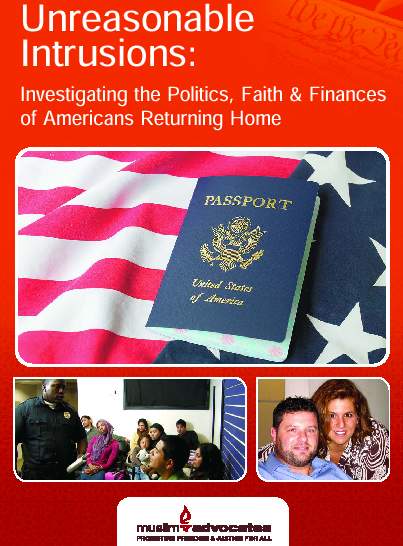
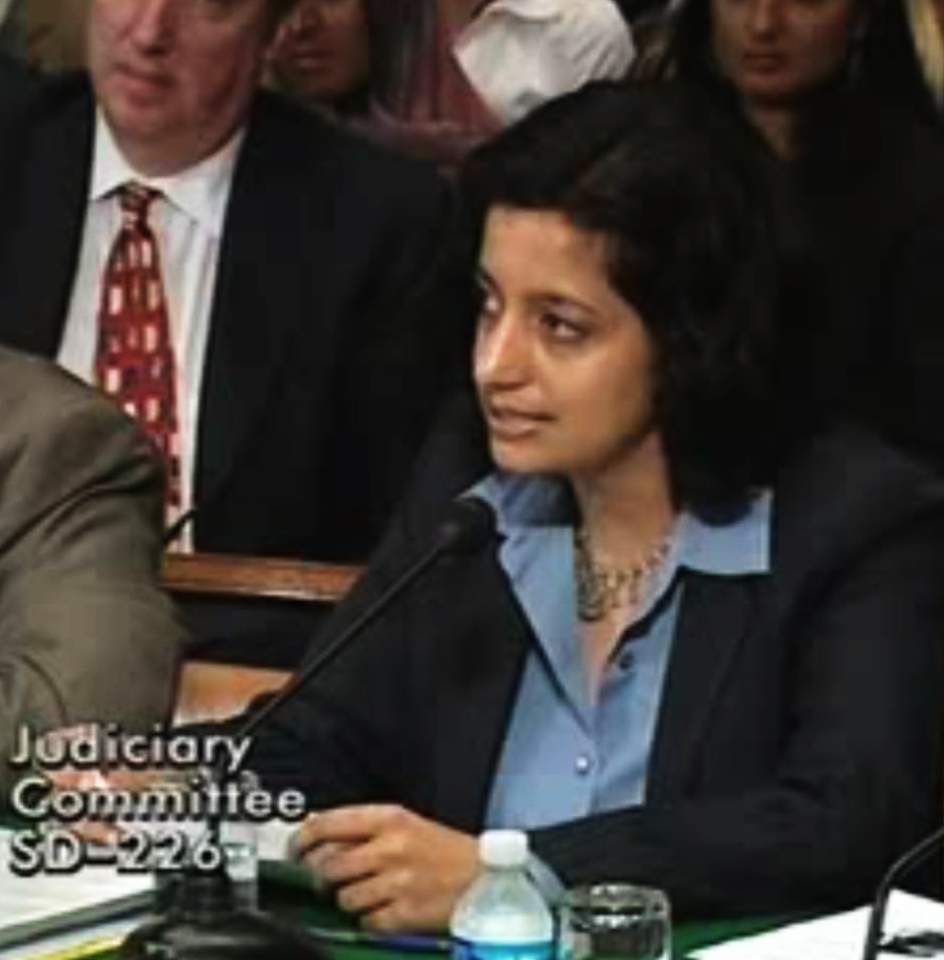
Unreasonable Intrusions Report
Last month, the Muslim Advocates released a report titled Unreasonable Intrusions: Investigating the Politics, Faith & Finances of Americans Returning Home. The report documents the systematic and widespread practice of federal agents interrogating Americans returning home after overseas travel at our nation’s borders and international airports. Muslim Advocates, a sister group with the National Association of Muslim Lawyers (NAML), which is a group of approximately 500 Muslim lawyers, law students and other legal professionals.
Farhana Khera:
- These are folks who are returning home from travel and they’re being stopped at borders, land crossings.
- After showing valid US passports, federal agents are engaging in very invasive questioning and searches of these Americans.
- Muslim or those Americans who may look Muslim.
- The questions (from border agents) go into first amendment protected areas. What mosque do you attend? How often do you pray?
- We want to educate federal policy makers, members of Congress, Homeland Security and the Obama Administration about this practice.
- Laptops, cameras and phones searched, in some cases asking about people in images, and how they particular individuals.
- Again, all of this without any evidence or suspicion.
- Ninth Circuit Decision US v Arnold, pretty much gives blanket authority to federal agents at the border to search laptops and electronic devices of law abiding Americans.
- We really need some standards in place that address the need of probable cause and reasonable suspicion before seizing personal data.
- We believe that Americans have the right to enter the country and not be compelled to answer questions, particularly about first amendment protected beliefs.
- We are giving practical advice in saying that you think this line of questioning is inappropriate. Get badge #’s of officers who have your stuff, then file a complaint.
- Traveler’s Privacy Protection Act – Proposed Legislation, to be re-introduced.
Guest – Farhana Khera, first Executive Director of Muslim Advocates and the National Association of Muslim Lawyers (NAML). Prior to joining Muslim Advocates and NAML in 2005, Ms. Khera was Counsel to the U.S. Senate Judiciary Committee, Subcommittee on the Constitution, Civil Rights, and Property Rights. In the Senate, she worked for six years directly for Senator Russell D. Feingold (D_WI), the Chairman of the Constitution Subcommittee. Ms. Khera focused substantially on the USA PATRIOT Act, racial and religious profiling, and other civil liberties issues raised by the government’s anti_terrorism policies since September 11, 2001. She was the Senator’s lead staff member in developing anti_racial profiling legislation and organizing subcommittee hearings on racial profiling.
—-
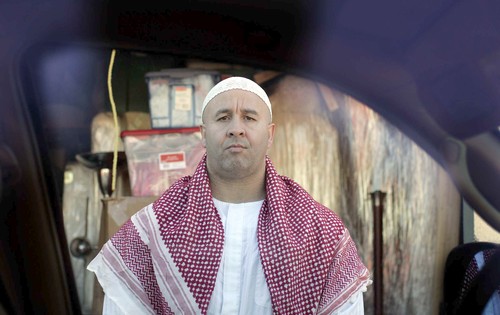
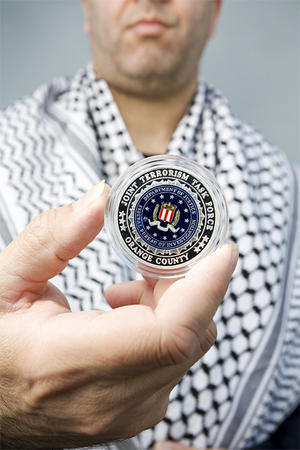
FBI Exposed: Federal Judge Orders FBI to Provide Full Muslim Surveillance Records
Last week a federal judge ordered the FBI to submit 100 documents detailing the bureau’s surveillance of Muslim leaders and organizations in Southern California and specifically, documents relating to the Council on American_Islamic Relations of Greater Los Angeles and its executive director. The court’s decision came in response to a 2007 lawsuit filed by the ACLU of Southern California that claimed the government’s incomplete and long_delayed response violated the Freedom of Information Act.
An attorney with the ACLU of Southern California says the surveillance records will show how the FBI infiltrated Southern California mosques and invasively monitored members of the Muslim community as if they were criminals.
“Truth can never be redacted. Only full disclosure will satisfy us and alleviate the pervasive fear in our communities and congregations,” said Shakeel Syed, executive director of the Islamic Shura Council of Southern California, who joins us today.
Shakeel Syed:
- It was confirmed in a court of law, under oath, that the FBI had employed informants, in one case, the informant was a former convicted felon.
- Craig Monteilh has multiple identities, he was given a different by the FBI and sent into one of the mosques.
- He embraced Islam proclaiming that he wanted to become Muslim and wanted to make his faith public.
- He abused the Islamic platform to gain trust in the community. The FBI told him the best way for you to infiltrate is to become Muslim and pretend to be a slow learner.
- The people at the mosque were alarmed when Craig Montel was encouraging others to blow up buildings in LA
- They called the FBI office on Craig Monteilh unaware that he was an informant. They brushed the report aside.
- Radiation monitoring of mosques
- We filed a FOIA request jointly not individually, which was good because what was suspected is now fully confirmed in the court of law that informants were paid as provocateurs in the area.
- In 2006, one of our members of the mosque, a student, ambushed an agent that was following him and he was apprehended by the University of Irvine campus police. We later filed a case against this individual and later never heard back from the campus police or the FBI.
- We received similar reports in our conversations with other community leaders in other areas such as Chicago, New York, Dallas, Detroit, Houston, Atlanta, Miami, San Francisco.
- It was revealed in some of the FBI surveillance documents that my private speeches were mentioned that were against the war in Iraq. Dalia Hashad – “They were in the mosque.”
- We continue to receive reports from the community on an almost ongoing basis from within the regions of Southern CA that the FBI has approached them to become informants, threatened them, intimidated them, offered them convenience of getting their naturalization papers expedited or immigration papers duly adjusted.
- I’m disgusted, but more emboldened to stand up and assert my rights.
Guest – Shakeel Syed, executive director of the Islamic Shura Council of Southern California.
———————————————————————————-
Afghanistan War, Civil Liberties, Extraordinary Rendition, Guantanamo, Habeas Corpus, Human Rights, Impeachment, Military Tribunal, Prosecution of the Bush Administration, Targeting Muslims, Torture, Truth to Power
Podcast: Play in new window | Download
Host Updates:
Hear more of the Jim Lehrer Newshour interview with Michael Ratner and Jeffrey Smith
—-

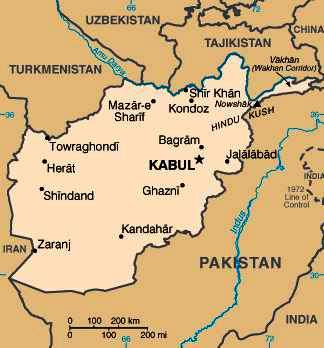

US To Escalate War in Afghanistan
Nearly 15 thousand US troops have been recently committed to Afghanistan, and progressive think tanks are pushing the Obama Administration to send an additional 17 thousand which would bring the total to 70 thousand troops. Expansions are being built onto the Bagram prison, as mass incarceration is expected. Progressive Think Tank Tells Obama to Escalate
Tom Hayden:
- Global Phoenix Program – in testimony last week, 10 – 12 years overall to win the Afghanistan War. Two years of hard fighting, a couple extra billion dollars a month. I think they plan to send the troops into Southern Afghanistan and to take on the Taliban or who ever the local resistance forces are.
- I think people need to buckle their seat belts for a war. We’re going to have a war in Afghanistan that’s soft on torture. Where are the human rights groups, we’re sending US troops into a dirty war that incarcerates without evidence, tens of thousands of people.
- Center for American Progress – I’m disappointed in them, they’re usually good liberal democrats. Now they’ve come out for a military surge in Afghanistan.
- Obama has narrowed it down to one goal. Can we prevent Al-Quaeda from getting a base area from which they can attack Europe or the United States. The more we go into Pakistan with the predators and drones, the more Pakistan turns against us. It becomes a recruiting tool for more militants.
- The other way to go would be to address the grievances of the Muslim world that give al-queda some support base.
- 1. The US unconditional support for Israel
- 2. 150 thousand troops still in Iraq
- 3. US troops in countries where Muslims control their own oil.
- It’s all laid out in a book by Michael Scheuer -Imperial Hubris: Why the West is Losing the War on Terror
- I work very closely with Robert Greenwald at Brave New Foundation. Getting Afghanistan Right. There’s a huge sectarian problem in the anti-war movement. Nonetheless there’s always a peace and justice community in every city I go to.
- One wonders what it will take for someone in the House or Senate to stand up and say I want to lead the anti-war movement.
Guest – Political and social activist Tom Hayden joins us today to fill in the detail and time line in this escalation of war. Tom is also the author of Ending The War In Iraq.
—–
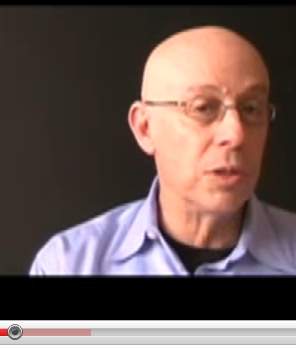


US War in Afghanistan and Pakistan – Follow Up
As tensions rise between Pakistan and the United States, President Obama recently mentioned that stability in Afghanistan depends on what will happen in Pakistan. The United States and Pakistan have been allies in their interest to purge Islamist extremism, however the two countries are now embroiled in miscommunication, drone wars and mistrust that is centered around a 10 billion dollar military aid fund. Analysts say the Obama administration is asking a lot from a fragile Pakistani government that has been in power for now only a year.
Michael Schwartz:
- President Obama’s speech – on Pakistan, tells the whole story. You have to unpack it.
- Not a lot of people have read the speech, Obama starts by saying a campaign against extremism will not succeed by bullets and bombs alone then he launches into the peaceful side of American policy.
- The US is planning to make Pakistan another outpost of globalization creating an opportunity for multinational corporations to invest into a local economy and basically take it over.
- What they’re saying is they’re trying to execute a policy to bring Pakistan into full economic domination of American capitalism. – a globalized version of American capitalism. The military aspect of this is only a part to secure the farthest reaches of the middle east, the part of instability.
- Obama’s speech is filled with being “adminstratively involved with Afghanistan and Pakistan.
- The delivery is profound American presence. American enterprises, adminstrators, experts, trainers, a kind of colonial presence, then on the other side of this, an integration into the global system.
- Private multinational enterprises will build schools, infrastructure.
- This same neo-liberal process has ocurred in Africa, South America and what we know about this process is that there is an extraction of large profits by these multinational corporations. The Taliban would set up a social organization that is incompatible with the globalized agenda, so you can see this as a counter-insurgency maneuver.
- The military part of this is that they’re not going to be able to do this in a peaceful way, they’re going to have to conquer the area.
- In a period of two years with more than 90 drone attacks have killed 5000 innocent Pakistanis. They want to kill civilians
- The sense that people are waiting to see whether Obama and Congress move to escalate the war is a big part of the lack of energy in the anti-war movement.
- These are colonial wars, because the United States seeks to have a real administrative hold over these countries.
- The United States can’t withdraw from Afghanistan because it borders on the three Caspian Sea oil companies. Those oil companies are gravitating toward China and Russia in the grand scheme of things.
- Regarding the Poppy agriculture in Afghanistan, the Taliban had gotten rid of the poppies, since the US had invaded Afghanistan, the poppy agriculture has come backWe talk today with Michael Schwartz about the current relations amid Pakistan, the United States and the war in Afghanistan.
- $1.5 billion in direct support to the Pakistani people every year over the next five years – resources that will build schools, roads, and hospitals, and strengthen Pakistan’s democracy. I’m also calling on Congress to pass a bipartisan bill co-sponsored by Maria Cantwell, Chris Van Hollen and Peter Hoekstra that creates opportunity zones in the border region to develop the economy and bring hope to places plagued by violence. And we will ask our friends and allies to do their part – including at the donors conference in Tokyo next month.
Guest – Michael Schwartz is a professor of Sociology and Faculty Director of the Undergraduate College of Global Studies at Stony Brook University, has written extensively on popular protest and insurgency as well as on American business and government dynamics. His books include the recently published War Without End.
———

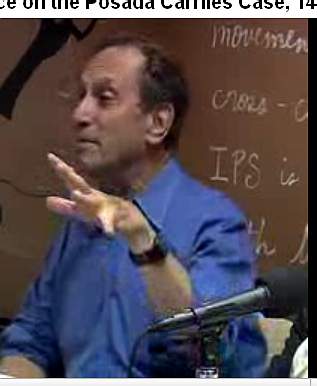
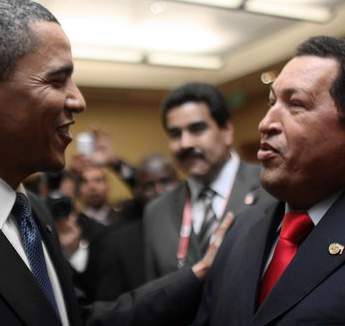
Cuba, South America and the Summit of the Americas
Earlier this year we spoke with film maker and Cuban scholar Saul Landau about the Cuban 50th anniversary and its significance. Now Saul describes the changes we can expect with regard to Cuban / US relations from the Obama Administration. The discussion also covers some detail of the recent talks at the Summit of the Americas in Trinidad.
Saul Landau:
- Obama has allowed Cuban Americans to travel freely to Cuba and allowing more loose travel regulations as well.
- What can Cuba really do except to promise to stop hitting the US in the fist with its face.
- What did Cuba do to the United States to merit 50 years of punishment?
- I don’t think Cubans are prepared to have 100 thousand Spring Breakers descend upon Havana.
- Nor are they prepared for American investors with big wads of cash, trying to buy up everybody and everything that they see.
- I think Obama is one of the cleverist, winsome, brightest people I can ever imagine, he’s a hard man to resist. But you have to get behind his optimistic rhetoric, his humility, his smile and his handshake and remember that prize fighters also shake hands before the first round.
- Cuba will have a lower profile in the future, we’ve seen the most publicity we’re going to see for quite a while now.
- I think things are little better, they’re a little quieter and less hostile. I think Cuba has its own problems that it really has to deal with
Guest – Saul Landau is an internationally known author, commentator, and film maker on foreign and domestic policy issues. Landau’s most widely praised achievements are the over forty films he has produced on social, political and historical issues, and worldwide human rights, for which he won the Letelier-Moffitt Human Rights Award, the George Polk Award for Investigative Reporting, and the First Amendment Award, as well as an Emmy for “Paul Jacobs and the Nuclear Gang.” In 2008, the Chilean government presented him withthe Bernardo O’Higgins Award for his human rights work. Landau has written fourteen books including a book of poems, “My Dad Was Not Hamlet.” He received an Edgar Allen Poe Award for Assassination on Embassy Row, a report on the 1976 murders of Chilean Ambassador Orlando Letelier and his colleague, Ronni Moffitt.
He is Professor Emeritus at California State University, Pomona. He is a senior Fellow at and Vice Chair of the Institute for Policy Studies.
————————————————————-
.
Afghanistan War, Civil Liberties, Criminalizing Dissent, Extraordinary Rendition, Guantanamo, Habeas Corpus, Human Rights, Iraq Veterans, Iraq War, Prosecution of the Bush Administration, Supreme Court, Surveillance, Targeting Muslims, Torture
Podcast: Play in new window | Download
Updates:
————
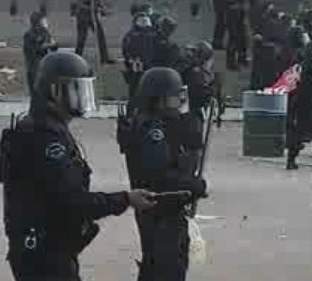
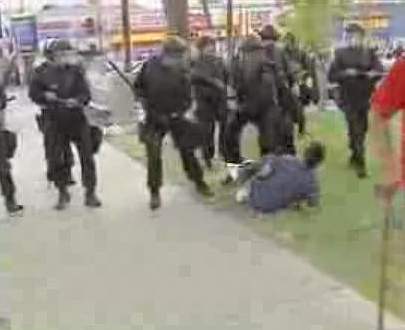

13 Million Dollar Payout in May Day LAPD Police Abuse Cases
In a landmark class action lawsuit settlement, the Los Angeles city council agreed to pay nearly 13 million dollars to those injured or mistreated in the 2007 May Day demonstration in MacArthur Park. As the march ended, LAPD riot police were filmed by camera crews using excessive force, firing rubber bullets and striking people with batons. Dozens were injured in the melee and the footage was seen around the world. The 13 million dollar settlement was part of a larger portion of nearly 300 May Day claims.
Carol Sobel:
- There was an immigrants rights march in MacArthur Park in Los Angeles on May 1st 2007, there has been for the last 7 years. The police didn’t want to give the group a permit to march in the streets.
- There are about 20 lawyers on this case, the National Lawyers Guild, the Guild’s Police Accountability Project and MALDEF, the Mexican American Legal Defense Education Fund.
- As around 10 thousand people approached the park, police “forgot” to direct people into the park.
- The rally was at the Northwest corner of park, so marchers had to cross an 8 lane highway that divides the park. This created chaos of which the problems arose.
- There was no instruction, people didn’t know where they were supposed to go.
- Then people got near police on motorcycles, they used their motorcycles to hit protesters. This was happening as an Aztec circle dance performance closed the march and opened the rally.
- Some protesters through trash, plastic water bottles at police. It was heard that the police said “We need to get rid of these people now.” Police were not giving orders to disperse, they simply said “move”.. to the 10 thousand people in the park.
- The officers were speaking only English, the crowd spoke almost all Spanish.
- Families had no idea why the police were coming with riot gear. While police were saying to move, people were thinking, “well I didn’t do anything wrong, they could’nt be talking to me.”
- So officers began knocking people down and hitting people, firing pellets, it was total chaos.
- 140 rounds of less lethal munitions were randomly fired into the crowds.
- The police report also stated there was no probable cause, no reason to go after the marchers.
- Lesson: It’s very difficult to change the culture of a police department. The police department can’t engage in this behavior, because we can’t afford it as a city.
Guest – California civil rights attorney Carol Sobel, who represented some of the injured. In 2000 Carol was struck by police pellets while serving as a legal observer during the Democratic National Convention.
———————–



Nora Eisenberg: When You Come Home
We’re pleased to have with us Nora Eisenberg, she’s the author of the recent book When You Come Home. It is a powerful novel that acknowledges the physical and psychological effects of veterans returning from Operation Desert Storm-The Persian Gulf War (2 August 1990 – 28 February 1991). In this beautifully written ant-war fiction, Nora delves into the corrosive effects post war combat has on the families and communities that are called on to nurture veterans returning home. Mimi is the main character who’s husband was killed in Vietnam, her 20 year old son Tony, a marine reservist, has returned from the Gulf War and there’s Tony’s childhood sweetheart, Lily who was raised by Mimi after her parents disappeared.
One book review describes When You Come Home this way: “In 1991, troops sent to Iraq for the first Gulf War returned home with a litany of physical, neurological, and psychological symptoms that collectively became known as Gulf War syndrome, a subject seldom dealt with in works of fiction. Eisenberg poignantly demonstrates that casualties of war occur both on and off the battlefield and ironically illustrates the vivid consequences when those in charge of veterans’ postwar care fail to meaningfully “support our troops.”
Nora Eisenberg:
- The First Gulf War – “The Good War”, 5 weeks of censorship and fabrication. Fabricated by a Washington based PR firm – Hill and Nolton. The campaign was headed by Craig Fuller. Fuller was also Chief of Staff for George H.W. Bush. Fuller took charge of the campaign to impress the public of what villians the Iraqis were.
- The firm brought this young girl to testify in front of a Congressional Committee – She claimed to work at a maternity ward in Kuwait. “The mean Iraqi soldiers” came in and hurled nearly 300 babies from their incubators and were left to die on the floor.
- This young girl was part of the Kuwaiti Royal Family, her father was Washington / Kuwait ambassador.
- All part of a 10 million dollar PR campaign with Hill and Nolton.
- Aside from the no-fly zones and sanctions, the deaths of Iraqis were massive and continuing.
- I’ve been following the deteriorating health system in Iraq and the rise of disease leading to the deaths of 2 million Iraqi children.
- I started writing this book with the “bad” war looming and with a sense that the ’91 war wasn’t over at all.
- I thought, are we going to kill millions again and get off scott-free, does it really work that way?
- Gulf War Illness, even among progressive people, there remains very little awareness of what this disease is. It attacks the respiratory system, the nervous system, it’s a neuro-toxic event.
- These soldiers got sick, immediately. Some say they got sick after swallowing an anti-nerve gas pill.
- When they were around the insecticides that were soaking the tents, they felt sick immediately, vertigo, stomach cramps.
- The soldiers loved ones, pets and wives coming down with similar symptoms, by proximity.
- It’s taken almost 20 years for Congress to say what the veterans already knew, that they were poisoned.
- A report delivered by high profile doctors at Roberta White say the soldiers were exposed to neuro-toxins. These were not neuro-toxins from Saddam Hussein.
- Those are main culprits, there are other terrible exposures that came out in a report last November.
- Such as the exposure to sarin in a weapons depository that affected 2-3 hundred thousand US soldiers.
- Nearly 15 thousand have died from Gulf War Illness. We have nearly 400 thousand US soldiers coming back as patients / nearly 40 percent are psychiatric patients.
Guest – Nora Eisenberg, New York City novelist and professor of English at the City University of New York (LaGuardia) and directs CUNY’s Faculty Publications Program. The War at Home ws a Washington Post Rave Book of the Year for 2002 and Just the Way You Want Me was awarded the 2004 Gold Prize in General Fiction from Foreword, the weekly of independent publishing. Her short stories, essays, and reviews have appeared in The Village Voice, Partisan Review, the LA Times, Tikkun., and numerous anthologies.
——————————————————–


















